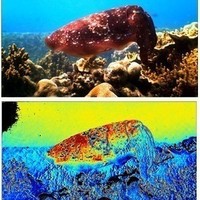Charles C. Jones Seminar
Bio-Inspired Sensors: From the Ocean to the Operating Room with Viktor Gruev, Department of Electrical and Computer Engineering, University of Illinois at Urbana Champaign
Abstract: Nature has served as an inspiration for novel, efficient and economic designs in architecture, engineering and science in general. In this talk, I will describe two bio-inspired imaging sensor designs and their use in providing real-time feedback to physicians in the operating room as well as in passive underwater geo-localization applications. The first sensor replicates the visual system of mantis shrimp by combining advancements in nanotechnology and semiconductor photodetectors to capture both color and polarization properties of light in real-time and with high resolution. This unique sensor is currently deployed in the Great Barrier Reef to study marine life behavior in their natural habitat and to better understand environmental changes in the reef.
The second sensory system is based on the Morpho butterfly visual system to realize a compact, highly sensitive, near infrared fluorescence imaging device. This imaging system employs tapetal spectral filters, i.e. stacks of nano-metric layers, with array of low noise CMOS detectors to sense color and multiple NIR channels simultaneously. The bio-inspired sensor is integrated with wearable goggles and used for tracking sentinel lymph node in patients with breast cancer. Pre-clinical and clinical data will be presented in this talk.
Biography: Viktor Gruev is an associate professor in the department of Electrical and Computer Engineering at University of Illinois at Urbana Champaign. Prior to joining UIUC, he was an associate professor in the Department of Computer Science and Engineering at Washington University in St. Louis. Prof. Gruev received his M.S. and PhD. in electrical engineering from Johns Hopkins University in 2000 and 2004 respectively. From 2004 to 2008, he was a postdoctoral researcher at the University of Pennsylvania. He has received numerous awards for his research on imaging sensors and their application in the medical field, including the 2016 Donald H Fink award for best paper published in any IEEE transaction and the 2015 best paper award at the IEEE Circuits and Systems Symposium. His current research focuses on developing bio-inspired sensory technology to address medical needs in resources limited hospitals.
